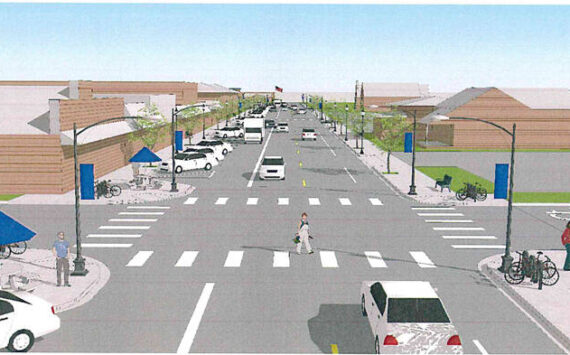By Randy Bracht | The Center Square
(The Center Square) – A Republican lawmaker from north-central Washington is among those who believe the Legislature should reevaluate, or possibly repeal, the state’s Climate Commitment Act and its cap-and-trade emissions offset program.
In a recent newsletter to 12th Legislative District constituents, state Rep. Mike Steele, R-Chelan, says the current program’s efficiency “is questionable” and the “undue financial pressure it places on working families is alarming.”
Steele is among those blaming the CCA for Washington’s current fuel prices, which are among the nation’s highest, plus the state’s alleged failure to provide a related fuel tax exemption to farmers transporting their goods to market.
Steele said he also finds it “bewildering that while our roads crumble,” revenues from the act’s cap-and-trade program are not going toward Washington’s transportation infrastructure in addition to supporting various environmental programs.
A better overall solution, he said, would be improving Washington’s forest management to reduce greenhouse gas emissions because forests absorb and store carbon dioxide from the atmosphere. “… unlike cap-and-trade, which primarily incentivizes carbon reduction by financial means, effective forest management provides other benefits such as biodiversity conservation, water purification, and recreational opportunities – increasing its impact on both our environment and society,” said Steele.
In 2021, Steele was among Republican lawmakers who voted against Senate Bill 5126, the Climate Commitment Act, which a Democratic majority passed in the state Senate by a 25-24 vote and in the House by a 54-43 margin. The bill was championed and signed into law by Democratic Gov. Jay Inslee.
In recent months, Inslee has repeatedly denied that the act and related cap-and-trade auctions are responsible for Washington’s surging gas prices. Instead, he has blamed oil companies for price gouging.
Last week, Sen. Joe Nguyen, D-White Center, who chairs the Senate Environment, Energy & Technology Committee, agreed with the governor. Nguyen is reportedly working on some form of legislation in response, possibly modeled after a price-gouging law in California. Skeptics question how effective that might be, considering that California has the nation’s highest fuel prices.
The far-reaching CCA seeks to reduced greenhouse gas emissions by 95% by year 2050. It directs the Washington Department of Ecology to implement a “cap” on greenhouse gas emissions from certain covered entities, including electric utilities and natural gas companies, and require them to purchase their emissions “allowances” in open auctions held quarterly. More than $1.4 billion has already been raised this year, higher than expected when the CCA was passed in 2021. The Department of Ecology estimated it would bring in approximately $220 million in 2023 and close to or just over $500 million every year after that through 2040. Prices above a certain “trigger price” can also prompt special auctions.
The revenues – the state calls them “investments” – go toward programs and projects intended to provide long-term environmental benefit from the impacts of climate change. Measures can include renewable energy resources, power grid modernization, low-emission building designs, high-efficiency appliances and “resilience” improvements to aquatic, forest, agriculture, grazing and wetlands.
Steele said he believes in “good policies that safeguard our environment for future generations,” but the policies need to be efficient and justified in costs they impose.
“The cap-and-trade program, in its current form, falls short of this ideal … (it) directly affects our pocketbooks, pushing Washington’s gas prices significantly above the national average,” he said.
In addition, Steele said the Legislature’s Democratic majority and state Department of Ecology have “turned a blind eye to the plight of farmers who need to get their goods to market.”
Last month, the Washington Farm Bureau and the Washington Trucking Associations sued Ecology, alleging the agency has improperly adopted regulations which eliminate a five-year tax exemption on diesel fuel used in farming operations and truckers hauling agricultural products on public roadways. The plaintiffs are seeking an administrative law review, claiming the rules are contrary to the CCA and costing them tens of millions of dollars in unpermitted fuel taxes.
Steele said state lawmakers should consider amending the act in their upcoming 2024 legislative session. He referred to CCA improvements proposed this summer by 25th District Sen. Chris Gildon, R-Puyallup, who called for more flexibility in emissions targets, adjusting auction floor and ceiling prices, increasing the number of allowances and considering a temporary rule to suspend the overall program in order to lower fuel costs.
The Department of Ecology said it is considering adoption of a new rule intended to “protect the integrity” of one aspect of the cap-and-invest program, the Allowance Price Containment Reserve auction. As proposed, auction purchases must be used to “meet a compliance obligation,” preventing them from being sold or traded on a secondary market for speculative purposes which have driven up costs. Public comments are being accepted through Nov. 1, including an online hearing scheduled at 10 a.m. on Tuesday, Oct. 24. Information is available on the APCR rulemaking webpage.
Steele also supports a proposed bill by 8th Legislative District Rep. April Connors, R-Kennewick, who is calling for registered vehicle owners in Washington to receive an annual “gas relief check” – $100 per individual or $200 for families – from auction revenues to offset their high fuel costs.
If amendments aren’t pursued by Ecology or legislators, then repealing the act should be considered, said Steele, who represents portions of Chelan, Douglas, King and Snohomish counties.
“Given the significant drawbacks of the cap-and-trade program, a repeal should be on the table. Our businesses, farmers, and average citizens shouldn’t bear such disproportionate financial burdens,” he said.






